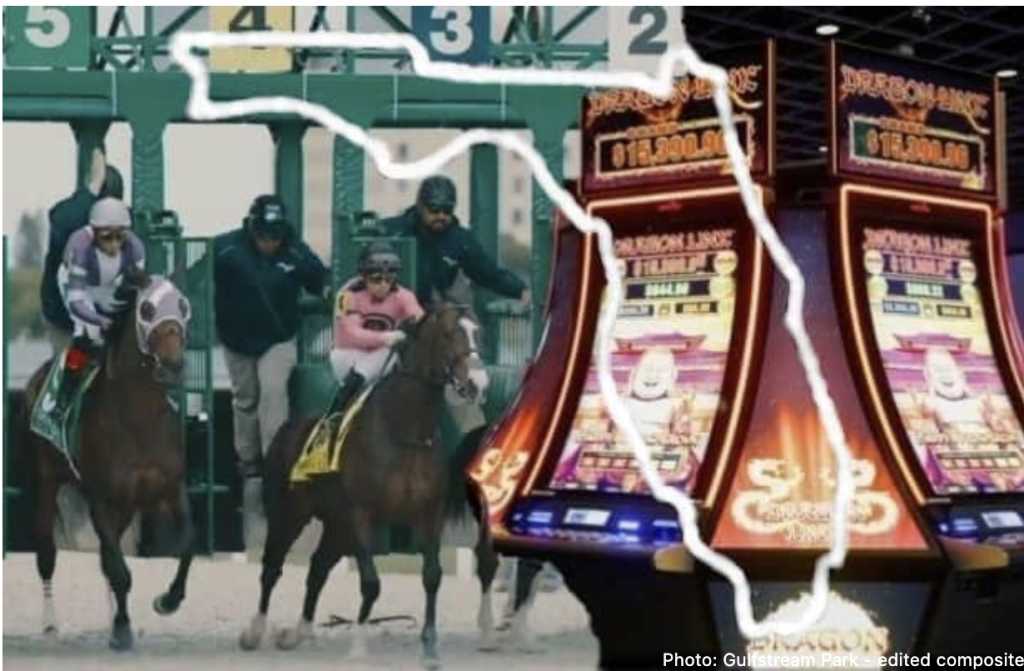Florida Racing Dodges Decoupling Blow – for Now
In a dramatic turn of events at Florida’s Capitol on April 15, a high-stakes proposal that would have severed slot machine revenue from live horse racing met an unexpected halt. With tensions running high and nearly 50 industry advocates ready to testify, the Senate abruptly pulled the bill from consideration. “We will not be hearing that bill today,” Senate committee chair Jason Brodeur announced without prior notice. “If you traveled, I am sorry, but we will not be hearing that bill.” The bill’s sudden derailment marked a major win for Thoroughbred advocates fighting to preserve Florida’s racing economy. Leading the resistance was Damon Thayer, a former Kentucky Senate majority leader recently appointed senior advisor to the newly formed Thoroughbred Racing Initiative. “It was the first sign we really had a legitimate chance to kill the bill,” Thayer recalled. Though decoupling advocates redirected their efforts to a House committee, the Senate’s inaction signaled a shift. Then came a decisive voice—Governor Ron DeSantis. Though decoupling advocates redirected their efforts to a House committee, the Senate’s inaction signaled a shift. Then came a decisive voice—Governor Ron DeSantis. “You can count on me as one that is not going to look favorably on legislation that’s going to decimate any of our signature industries,” DeSantis said at the Ocala Breeders’ Sales spring auction two days later. By May 2, when the legislative session closed without a vote, the proposal was effectively dead.
Behind the Scenes: Organizing the Opposition
The campaign to stop decoupling had been quietly brewing for months. In January, 1/ST Racing, owners of Gulfstream Park, publicly declared their intent to seek decoupling, backed by a summer agreement with local horsemen in exchange for expanded insurance coverage.“We were 50-1 to beat this,” Thayer said. “When this started out, it was on the fast track, and it was 3-5 to pass. National and local stakeholders rallied. The Florida Thoroughbred Breeders’ and Owners’ Association (FTBOA), joined by groups like The Jockey Club and the National HBPA, worked tirelessly behind the scenes. FTBOA CEO Lonny Powell noted, “During my 15 years here as CEO, the only common denominator in the decoupling battles is the FTBOA in terms of opposing it.” Mark Casse, a U.S. and Canadian Hall of Fame trainer and longtime Floridian, helped form the Thoroughbred Racing Initiative. “The guy that made the most sense to help lead us…was Damon,” Casse said. Thayer was barely retired from politics when he got the call. Soon, he was on Zoom calls and flights to Tallahassee, strategizing. When the Senate committee hearing was canceled, he quickly mobilized supporters, sending a pared-down group to the House while others stayed behind to monitor the Senate. “It was chaotic,” Thayer admitted. “But we were organized and prepared.”
Momentum and Money
The optics mattered. So did the money. On April 25, public filings showed that Mike Repole, a billionaire racing owner, had donated $300,000 to the Florida Freedom Fund, a DeSantis-linked PAC. Others followed: Mandy Pope gave $100,000, and Will and Sarah Farish added another $50,000 combined. Repole declared victory early: “I feel pretty confident saying that decoupling ended today.” Still, the financial support came only after momentum had shifted. “We met with [DeSantis] early…and made the case that this industry was too important,” Thayer said. DeSantis’s public remarks reflected that sentiment. “We have proposals that will have the effect of harming the industry…to basically benefit one special interest,” he said. “That’s not how you do good policy.
What’s Next?
Though the bill died quietly, uncertainty looms. 1/ST Racing officials have stated publicly that without decoupling, they can’t promise racing’s future at Gulfstream Park. “The value of the property in an urban area…is substantial,” said Stephen Screnci, 1/ST’s president of racing and business development. “At what point do you continue in a business that’s not making money?” While racing continues and dates for the 2025–26 meet are expected soon, long-term viability remains unclear. “We won the first round,” Casse said. “The problem is I think there’s about 10 rounds.” Thayer, now an advisor in other racing states like Iowa, remains committed. “My new job is to save horse racing one state at a time,” he said, only half joking.

